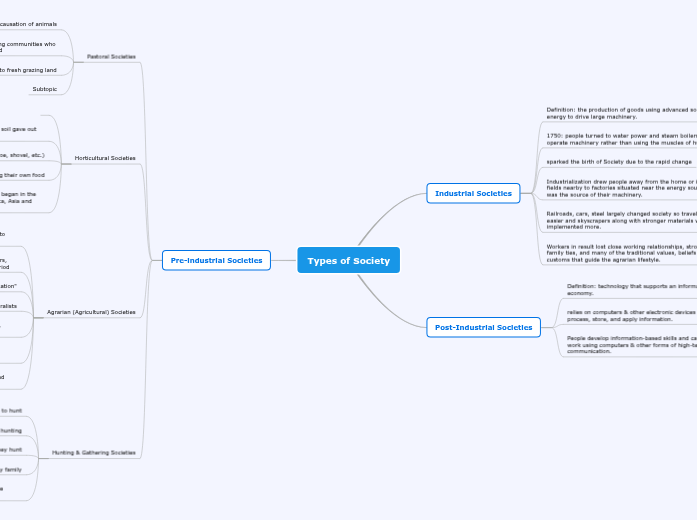Types of Society
Industrial Societies
Definition: the production of goods using advanced sources of energy to drive large machinery.
1750: people turned to water power and steam boilers to operate machinery rather than using the muscles of humans
sparked the birth of Society due to the rapid change
Industrialization drew people away from the home or in the fields nearby to factories situated near the energy sources that was the source of their machinery.
Railroads, cars, steel largely changed society so travel was easier and skyscrapers along with stronger materials were implemented more.
Workers in result lost close working relationships, strong family ties, and many of the traditional values, beliefs and customs that guide the agrarian lifestyle.
Post-Industrial Societies
Definition: technology that supports an information-based economy.
relies on computers & other electronic devices that create, process, store, and apply information.
People develop information-based skills and carry out their work using computers & other forms of high-technology communication.
Pre-industrial Societies
Pastoral Societies
Definition: domestic causation of animals
Pastoral societies were very common among communities who lived where there were few supplies of food
Nomadic people, leading herds to fresh grazing land
Subtopic
Horticultural Societies
formed settlements and moved, only when the soil gave out and lost nutrition
The use of hand tools to raise crops ie.(hoe, shovel, etc.)
gave up gathering in favor of growing their own food
This society was common in fertile regions and began in the Middle East, but later dispersed to Latin America, Asia and eventually all over the world
Agrarian (Agricultural) Societies
Definition: large-scale cultivation using plows harnessed to animals or more powerful energy sources
animal-drawn plow, irrigation, the wheel, writing, numbers, and use of various metals were inventions during this period
called "the dawn of civilization"
cultivated fields much larger than horticulturalists
farmers worked lands for generations thanks to the plow, encouraging development of permanent settlements
extreme social inequality, as a large scale of people are peasants or slaves, who do the majority of the work
Elites in this society had time to study philosophy, art, and literature
Hunting & Gathering Societies
used simple tools to hunt
little to know free time due to hunting
Nomadic people, traveling as they hunt
Very dependent on each other, specifically family
until about 12,000 years ago and before, everyone were hunters and gatherers
